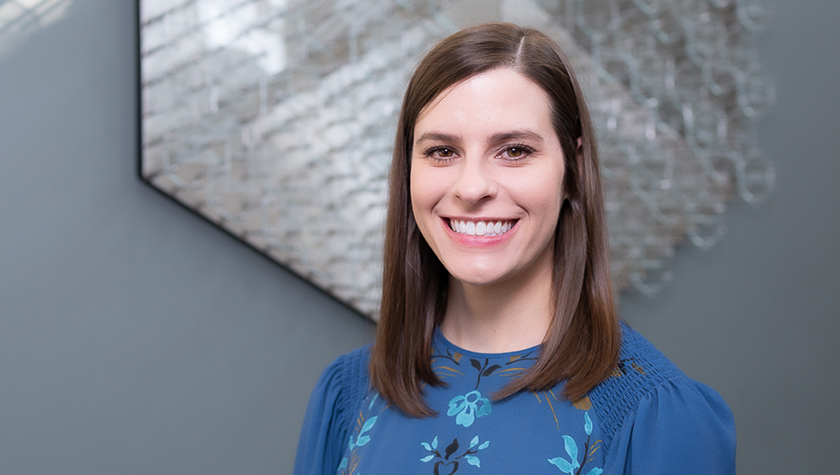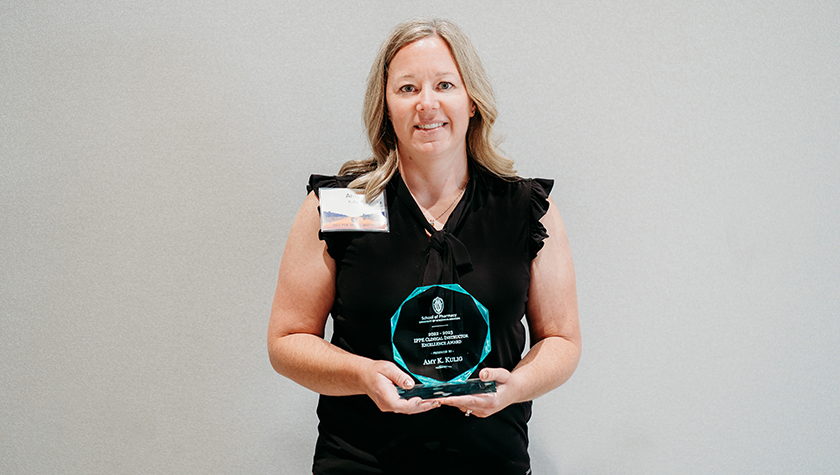
Barnes is honored for providing School of Pharmacy students with exceptional guidance at the Milwaukee VA
By Olivia Bouchard
Jeremy Barnes, internal medicine clinical pharmacy specialist at the Clement J. Zablocki VA Medical Center in Milwaukee, has been a preceptor for five years.
“There’s good teaching and learning going both ways, and everybody is accomplishing more as a result. I think we really embrace that, and we hear very consistently from students that they enjoy that aspect of our learning experience,” he says.
For Barnes’ exceptional work as a preceptor, he is receiving the 2023 Larry Boh APPE Clinical Instructor Excellence Award from the University of Wisconsin–Madison School of Pharmacy. This student-nominated award honors preceptors who demonstrate an exceptional passion for instruction and outstanding communication and professionalism during PharmD students’ fourth-year Advanced Pharmacy Practice Experiences (APPEs).
“It’s humbling to be commended by trainees who demonstrate excellence in their own work,” says Barnes. “I think it means we are doing something right in trying to host a learning environment where students can see the value of their contributions to our patients and the progress in their own professional development.”
“I really enjoy watching the process of them taking ownership of their own development and recognizing the progress that they’re making because they see that they’re having more of an impact than expected.”
—Jeremy Barnes
At the VA Medical Center in Milwaukee, Barnes works as an internal medicine clinical pharmacy specialist. He first discovered his interest in internal medicine during his own APPE rotations.
“I went into my APPEs with thoughts on what my interests were, and I came out of it with interests in internal medicine, mental health, and academia, thanks to the preceptors and experiences that I had,” says Barnes.
He gravitated to the Milwaukee VA because of its strengths in those areas, as well as the opportunity to serve veterans.
“It is really rewarding to serve those who served and to have that basis of service as part of your practice,” he says.
Barnes’ role at the VA includes a variety of responsibilities, and he says he enjoys the balance of tasks that his role brings.
“I get to work with students very commonly, I get to be involved in administrative and quality improvement projects. But then I have a lot of direct patient care responsibilities,” he says.

Barnes enjoys sharing all parts of his role with his students and enjoys the flexibility that the internal medicine environment brings to help students further explore and discover their own interests. For example, student pharmacists can get experience with transitions of care, working with a team of physicians, specific drug monitoring, and direct patient care.
“It’s an opportunity to get to know people and their interests so that we can approach the learning experience in a way that they’re going to get the most out of it for something that they’ll use in their future career as a pharmacist, not just for our benefit,” he says.
Creating a personalized experience for each PharmD student who comes through is a unique aspect of Barnes’ precepting style, something he refers to as personalized professional development.
“For personalized professional development, we’re getting to know someone and helping to refine the learning experience, even if we can’t change everything about it, to come at it from a different perspective and relate it to their unique professional goals and development,” says Barnes.
Every new student pharmacist who comes into the program every six weeks brings a new perspective and leaves a mark on the practice, even if they don’t know it, says Barnes.
“I really enjoy watching the process of them taking ownership of their own development and recognizing the progress that they’re making because they see that they’re having more of an impact than expected,” he says.
Above all else, Barnes hopes to help students refine their professional identity.
“A lot of learners do better once they realize that their performance is less about what they know off the top of their head, and a lot more about how they can use their resources to help get to a right answer,” says Barnes. “And once they take that pressure off themselves, it ultimately results in better patient care, because we’re willing to look into things that would otherwise be intimidating and we’re embracing the things that we don’t know and getting better as a result.”
Precepting adds variety and diversity to his role, Barnes says. Through being a clinical instructor, he builds new relationships and strengthens different areas of his own practice.
“Every time we get a student every six weeks, that’s a different person to get to know — they’re going to come with different strengths, different interests, different areas to work on,” says Barnes. “And that creates a totally different experience with something different to enjoy.”

